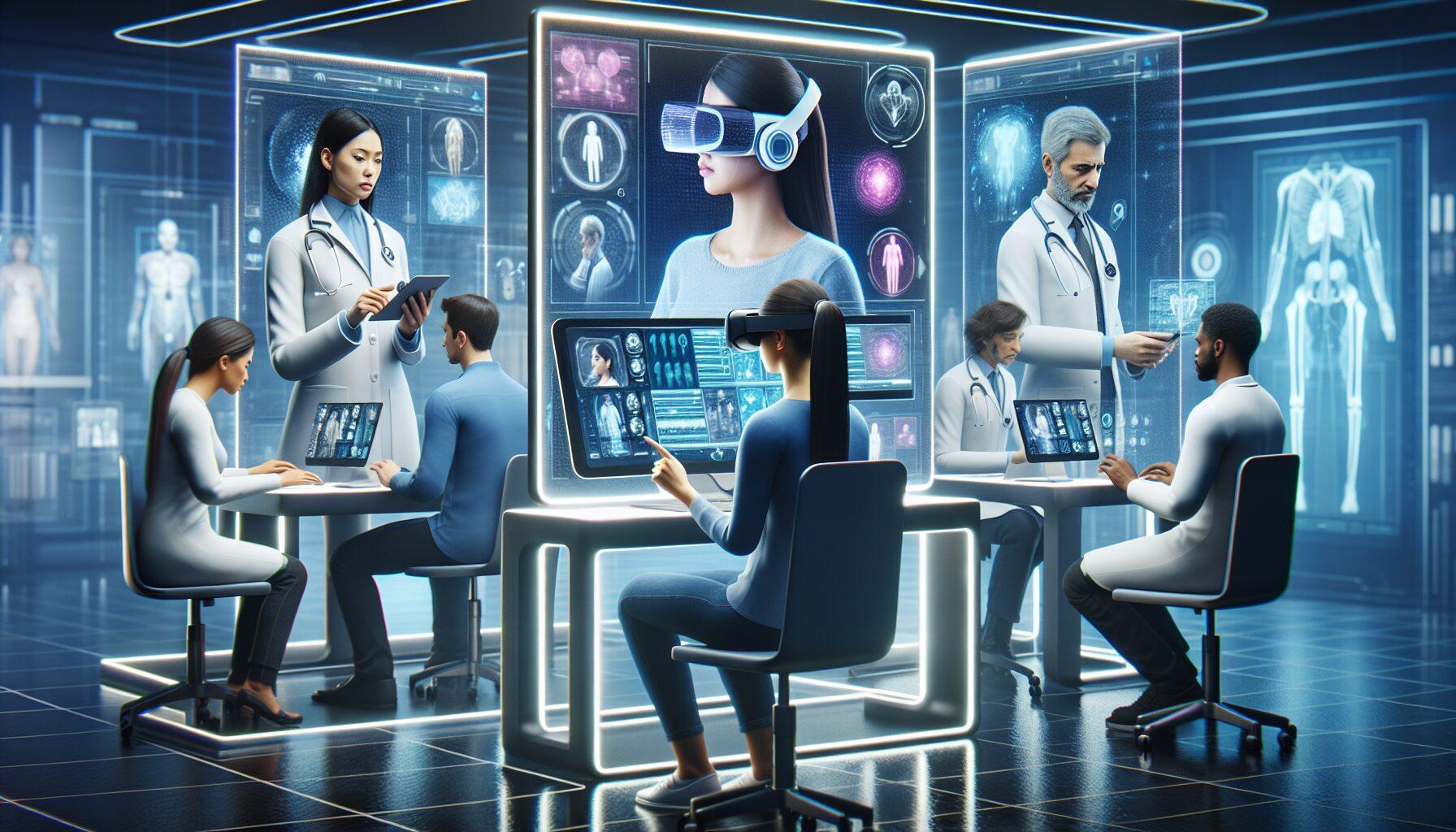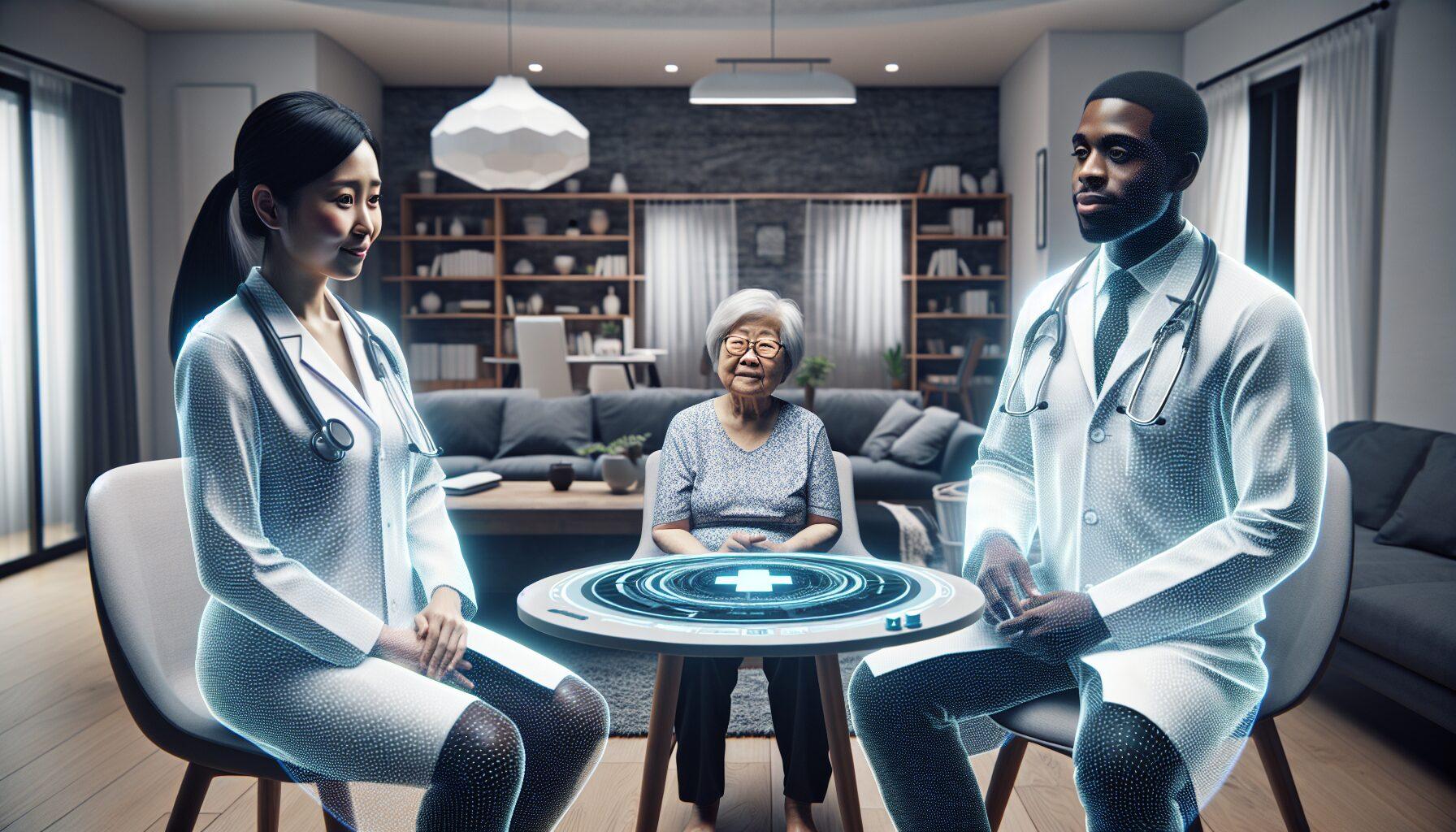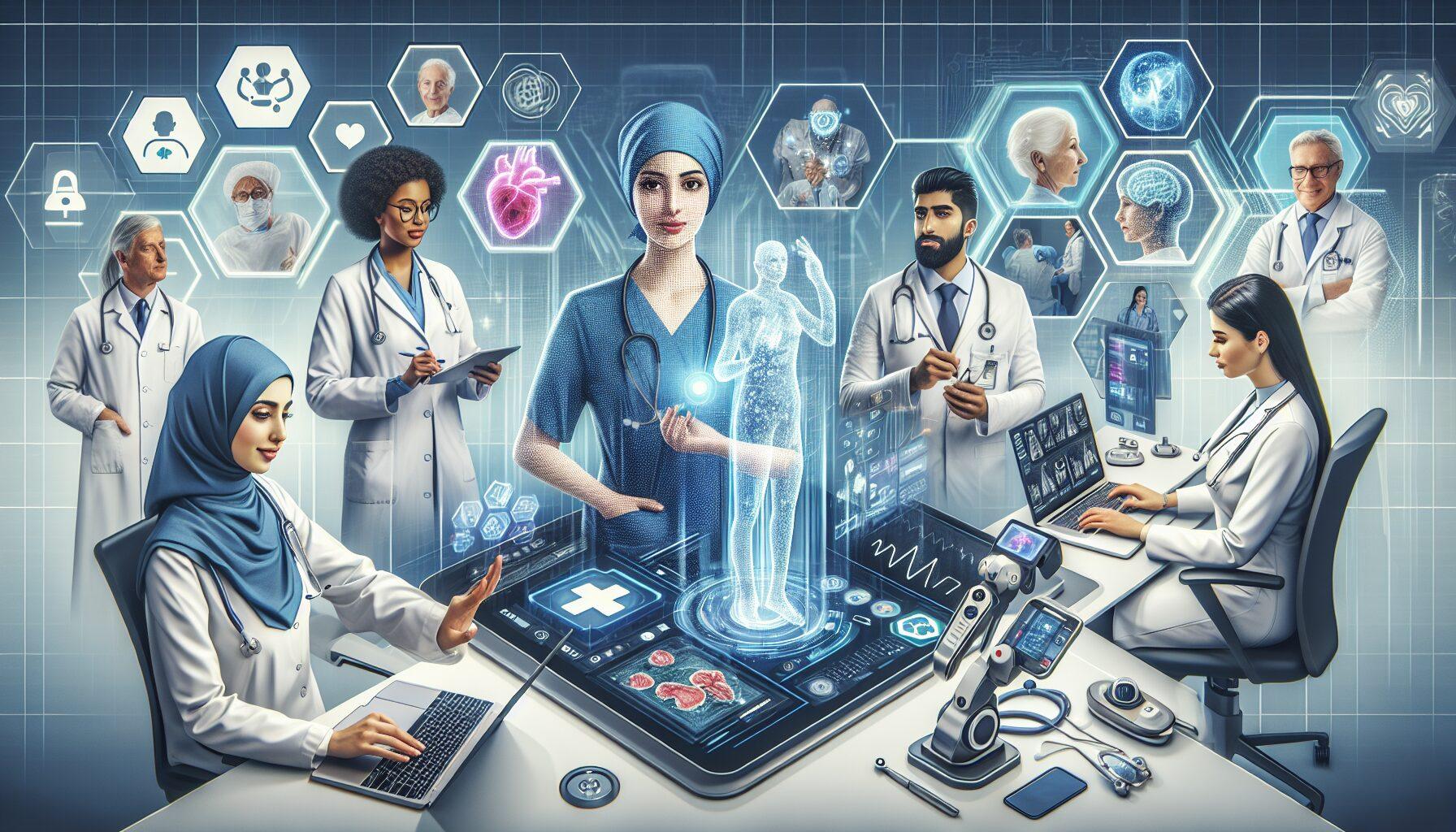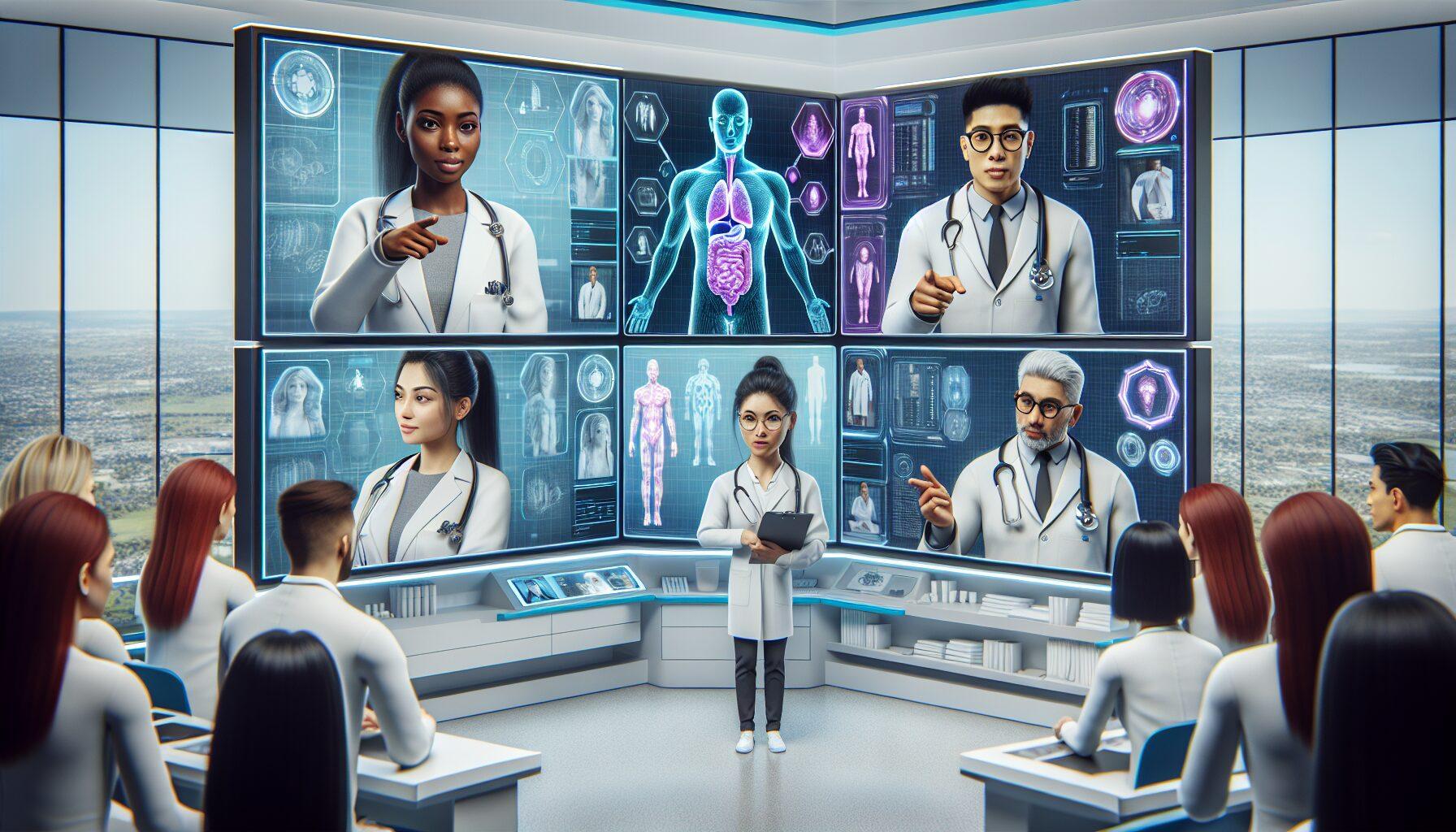Virtual Doctors: The Healthcare Crossroads of 2025
Q: Can a robotic physician substitute for my household doctor?
A: As we stand on the healthcare crossroads of 2025, the controversy between digital medical doctors and conventional care is extra heated than ever. While AI-driven digital physicians provide the attract of 24/7 availability and prompt entry to medical data databases, they lack the private contact and years of expertise that include a household doctor.
However, it is essential to acknowledge that this is not a zero-sum sport; the mixing of AI into healthcare is supposed to enhance, not substitute, the invaluable human component of medical follow. Not solely—however in 2025, digital care is now not a novelty. It’s a $450 billion business augmenting (not changing) conventional medication.
Why This Matters
The burgeoning digital care sector, powered by AI personalization, is revolutionizing the affected person’s expertise. By harnessing the huge portions of information obtainable, AI techniques can tailor therapies and well-being plans to the person, taking into consideration their distinctive genetic make-up, lifestyle, and medical historical past.
This stage of customization not solely elevates the usual of care but in addition empowers sufferers to take an lively function of their well being journey, fostering a partnership between AI-enhanced instruments and the irreplaceable human contact of healthcare professionals.
Imagine a world the place AI diagnoses uncommon ailments quicker than any human, but sufferers nonetheless crave the heat of a stethoscope. By 2025, 60% of U.S. adults have used telehealth, but ER wait instances are nonetheless common at 2.6 hours. The conflict between comfort and human contact defines trendy healthcare. Dive into the info, tales, and surprises shaping this revolution.
The Main Part: Dissecting the Future of Care

1. How Has Virtual Care Evolved by 2025?
By 2025, digital care will have undergone an exceptional transformation, propelled by advances in AI and machine studying. Telemedicine, as soon as a mere complement to in-person visits, has developed into a cornerstone of healthcare supply, providing sufferers entry to high-quality care from the consolation of their properties.
This evolution has been pushed by a surge in good diagnostic instruments and AI-powered personalization, which have considerably improved the accuracy and effectiveness of distant consultations, making them an extra interesting choice for sufferers and healthcare suppliers.
Virtual care has transcended Zoom calls. Today, it’s AI-powered platforms like Babylon Health predicting coronary heart failure dangers by way of voice evaluation and Hims & Hers prescribing customized psychological well being plans. The 2023 WHO Global Strategy on Digital Health catalyzed this shift, with 5G enabling real-time distant surgical procedures in rural India.
Case Study: The case examine in query illuminates the transformative impression of AI personalization in healthcare. For occasion, in a distant village in Maharashtra, a affected person with a posh cardiac situation was in a position to obtain a life-saving operation.
This was made attainable by means of a 5G-enabled digital interface that related native surgeons with specialists in Mumbai, who guided the process with precision akin to being current within the working room.
The AI system not solely facilitated the real-time alternate of high-definition imaging and very important knowledge but in addition predicted potential issues by analyzing the affected person’s medical historical past and genetic markers, permitting the group to tailor the surgical strategy.
This stage of individualized care, beforehand unimaginable in such distant settings, is quickly setting new requirements for medical interventions worldwide. Cleveland Clinic’s “Hospital at Home” program lowered readmissions by 35% by utilizing IoT sensors and digital check-ins (Source: New England Journal of Medicine, 2024).
2. Pros and Cons: Virtual vs. Traditional Care
| Factor | Virtual Care | Traditional Care |
|---|---|---|
| Cost | 50avg.consultvs.50avg.consultvs.150 in-person | Higher overhead, insurance coverage hurdles |
| Accessibility | 24/7 international attain | Limited by geography, wait instances |
| Diagnostic Tools | AI algorithms, wearable integration | Hands-on exams, superior imaging |
| Patient Trust | 58% belief AI for power care (Forbes) | 82% choose in-person for emergencies |
Expert Insight: The dynamic interaction between AI personalization and healthcare supply continues to evolve as know-how advances. Experts within the area acknowledge the potential of AI to revolutionize affected person care by offering extremely custom-made remedy plans, predicting well-being outcomes, and helping in early illness detection.
However, in addition they emphasize the significance of sustaining a human contact, particularly in vital care conditions the place empathy and human judgment are irreplaceable.
Balancing AI’s effectivity with the nuanced understanding of a medical skill is vital to harnessing the very best of each world, guaranteeing that sufferers obtain not solely essentially the most knowledgeable care but in addition the compassionate assistance they want. Dr. Eric Topol (Scripps Research) states, “AI gained’t substitute medical doctors however will democratize experience.”
3. When Should You Choose Virtual vs. In-Person Care?

Step-by-Step Guide:
1: Routine Checkups: Virtual care, also called telemedicine, is a superb choice for routine checkups the place bodily examination is just not vital. These appointments can embrace medicine consultations, psychological well-being periods, or follow-up discussions about lab outcomes.
Opting for digital visits in these eventualities can save time and eradicate the necessity for the journey, making healthcare extra accessible, particularly for those with mobility points or those residing in distant areas. Virtual (e.g., blood stress monitoring by way of Fitbit).
2: Complex Symptoms: For power situations requiring common monitoring, AI personalization may be notably useful. By analyzing knowledge developments over time, AI techniques can present sufferers with tailor-made recommendations and alerts, guaranteeing they obtain essentially the most related care.
This proactive strategy might help within the early detection of potential issues, permitting for well timed intervention and probably higher outcomes.
Moreover, customized AI instruments can help in medicine administration, reminding sufferers when to take their prescriptions and even adjusting dosages based mostly on real-time well-being knowledge, all under the supervision of healthcare professionals. Traditional (e.g., unexplained chest ache).
3: Mental Health: In the realm of psychological well-being, AI personalization presents a beacon of hope for people looking for assistance. Tailored AI-powered functions can present real-time monitoring and interventions for these battling psychological well-being points, providing coping methods and customized remedy periods.
By analyzing speech patterns, textual content inputs, and physiological knowledge, these clever techniques can detect early indicators of misery and immediate customers to interact in actions or workouts designed to alleviate their signs, thus serving as a complement to conventional remedies and probably even stopping crises earlier than they escalate. Hybrid (e.g., app-based CBT + month-to-month therapist visits).
Pro Tip: To ensure the effectiveness of AI personalization in psychological well-being, it’s essential to take care of stability between know-how and human interplay. While an app can present speedy assistance and customized content material, the nuanced understanding and empathy of a human therapist are irreplaceable.
By combining AI-driven personalization with common therapist periods, people can obtain an extra holistic strategy for their psychological well-being, guaranteeing that the know-how acts as a supportive software slightly more than a standalone answer.
This synergy not solely enhances the therapeutic course but in addition fosters a way of security and belief for the customers, figuring out {that a} skilled is overseeing their progress and might intervene when essential. Use the CDC’s Telehealth Decision Tree to evaluate your wants.
4. The Rise of Hybrid Models

As we transfer ahead, the mixing of AI personalization inside hybrid fashions of healthcare supply is changing into more and more prevalent. These fashions mix conventional face-to-face consultations with AI-driven digital help, providing a extra tailor-made strategy to affected person care.
By leveraging refined algorithms, healthcare suppliers can now ship customized recommendation and remedy plans which are continually refined based mostly on real-time knowledge, guaranteeing that every affected person receives the simplest care attainable.
2025’s profitable mannequin? Hybrid care. Startups like Forward Health mix AI triage with boutique clinics. Mayo Clinic’s “Digital Twin” challenge creates digitally affected person replicas for customized remedy testing.
Visual Element: Personalization by means of AI extends past the medical area, seeping into our on a regular basis lives. Retail giants like Amazon and Netflix have lengthy harnessed the facility of machine studying algorithms to foretell client preferences, providing suggestions that really feel individually curated.
This stage of customization is changing into the norm, with AI-driven private assistants adapting to our routines, suggesting when to go away for appointments based mostly on on-site visitors, and even serving to handle private funds by studying spending habits.
As these applied sciences advance, the road between digital comfort and private contact continues to blur, promising a future the place AI personalization is seamlessly built-in into the material of day-by-day existence. Flowchart exhibiting hybrid care-affected person journey.
5. Ethical and Privacy Challenges

Navigating the complicated interaction of ethics and privateness in AI personalization is paramount. As AI techniques be taught from consumer knowledge to ship tailor-made experiences, in addition they increase issues in regards to the extent to which private knowledge is collected, saved, and utilized.
It is essential to ascertain strong frameworks that guarantee transparency and consumer consent, safeguarding in opposition to the misuse of delicate data whereas sustaining the belief essential for these techniques to be efficient and accepted by the general public.
While blockchain secures data, a 2024 JAMA examination discovered racial bias in AI dermatology instruments. The FDA now mandates “algorithmic transparency” for all medical AI.
Frequently Asked Questions
1: Is digital care as correct as in-person visits?
The debate about the accuracy of digital care in comparison with in-person visits continues to spark discussions throughout the medical neighborhood. While certain situations may be successfully recognized and managed using digital platforms, the consensus means that they don’t seem to be universally equal to conventional face-to-face consultations.
Nonetheless, developments in AI personalization are bridging this hole, with techniques changing into more and more adept at tailoring interactions and coverings to the particular person affected person wants, thus enhancing the standard of distant healthcare providers. Yes, for routine points. AI diagnostics match human accuracy in 93% of instances (MIT, 2024), however, bodily exams stay irreplaceable.
2: Can I take advantage of telehealth for emergencies?
While telehealth is usually worthwhile software for preliminary consultations and follow-up appointments, it’s not sometimes advisable for emergencies that require speedy, hands-on medical intervention. In emergencies, time is of the essence, and the bodily presence of medical professionals is essential to offering mandatory assessments and coverings directly.
However, telehealth can play a supportive function in emergencies by permitting specialists to remotely information on-site personnel by means of complicated procedures or by facilitating swift communication between completely different healthcare suppliers. No—go to an ER. Virtual care excels for follow-ups, prescriptions, and psychological well being.
3: Are digital medical doctors cheaper?
Certainly, one of the many key benefits of digital physician consultations is cost-effectiveness. Without the necessity for bodily workplace area and the related overhead prices, healthcare suppliers can provide providers at a lowered fee. Additionally, sufferers save on journey bills and time, which may be notably useful for those residing in distant areas or with mobility points.
This affordability and comfort make healthcare extra accessible, probably main to raised preventative care and lowered emergency room visits for non-urgent points. Often, however insurance coverage protection varies. Check platforms like Zocdoc for real-time price comparisons.
4: How do I confirm a digital physician’s credentials?
Ensuring {that a} digital physician is credentialed and certified is paramount to receiving secure and efficient care. Most telehealth platforms have stringent verification processes in place, requiring healthcare professionals to submit their licenses and certifications for evaluation earlier than they’ll provide providers on the platform.
Additionally, sufferers can examine a doctor’s credentials by means of their state’s medical board or use on-line verification databases such because the American Medical Association’s DoctorFinder or the Federation of State Medical Boards (FSMB) web site.
It’s at all times advisable to do your due diligence and feel snug with the healthcare supplier’s {qualifications} earlier than beginning a digital session. Use the AMA’s Verify a Physician software or state medical board databases.
5: Will AI make human medical doctors out of date?
While AI has the potential to revolutionize healthcare by offering customized remedy plans and helping in diagnostic processes, it’s not poised to render human medical doctors out of date.
The function of physicians is multifaceted, involving not simply the technical elements of care but in addition the human contact, empathy, and moral decision-making that AI can not replicate.
Furthermore, the mixing of AI in medication is extra about augmenting the capabilities of healthcare professionals, permitting them to give attention to extra complicated and nuanced elements of affected person care that require a human perspective. Unlikely. Patients nonetheless worth empathy—73% say a health care provider’s bedside method impacts restoration (WebMD Survey, 2025).

Conclusion: The Best of Both Worlds
Indeed, the harmonious integration of AI personalization inside healthcare settings presents a promising future in the place where know-how and human contact coalesce to reinforce affected person outcomes.
By leveraging AI to deal with routine duties and analyze huge quantities of information, healthcare suppliers can personalize their strategy to every affected person, guaranteeing that therapies usually are not solely efficient but in addition resonate on a private stage.
This synergy between cutting-edge know-how and the irreplaceable human component creates a complete care mannequin that caters to the holistic wants of sufferers. The future isn’t “both/or.” It’s leveraging AI for velocity and knowledge while preserving human connection for empathy and complicated care.
Call to Action:
- New to telehealth? Embrace the way forward for healthcare by integrating AI personalization into your telehealth expertise. Experience the seamless mix of cutting-edge know-how with the heat of human contact, all from the consolation of your residence.
- Don’t let distance or busy schedules compromise your entry to customized, compassionate healthcare. Start your journey with AI-enhanced telehealth immediately and witness a brand new period of medical comfort and effectiveness unfold earlier than you. Try a free symptom checker like Ada Health.
- Share Your Story: Embrace the transformative energy of AI personalization in healthcare, the place where each facet of your medical expertise is tailor-made to your distinctive wants and lifestyle. With superior algorithms analyzing your well-being knowledge, you will obtain care that is not simply reactive, but predictive, serving you to remain one step forward of potential well-being points.
- This is a world the place your voice is heard and your well-being journey is as particular person as you might be, guaranteeing that the recommendations and coverings you obtain are as exact and efficient as attainable. How has hybrid care impacted you?
Discussion Questions:
1: Hybrid care, with its mix of conventional and digital healthcare practices, has revolutionized the best way we strategy our well-being. It presents a seamless integration of in-person consultations and digital check-ins, permitting steady care that matches into our busy lives.
The personal touch of AI signifies that each facet of our well-being routine is tailor-made to our distinctive wants, making us really feel extra in management and genuinely cared for.
This revolutionary strategy not solely saves time but in addition enhances the standard of care, because it permits for speedy changes to remedy plans based mostly on real-time knowledge and suggestions. Would you belief an AI to diagnose your youngster?
2: The prospect of entrusting our kids’s well being to an AI may appear daunting at first look. However, once we think about the huge capabilities of AI to course of and analyze knowledge far past human capability, it is clear that such know-how may provide unparalleled insights into pediatric care.
By leveraging the facility of machine studying, AI techniques can detect patterns and anomalies that may elude even essentially the most skilled practitioners, guaranteeing that diagnoses usually are not solely swift but in addition extremely correct. What healthcare innovation excites you most?


